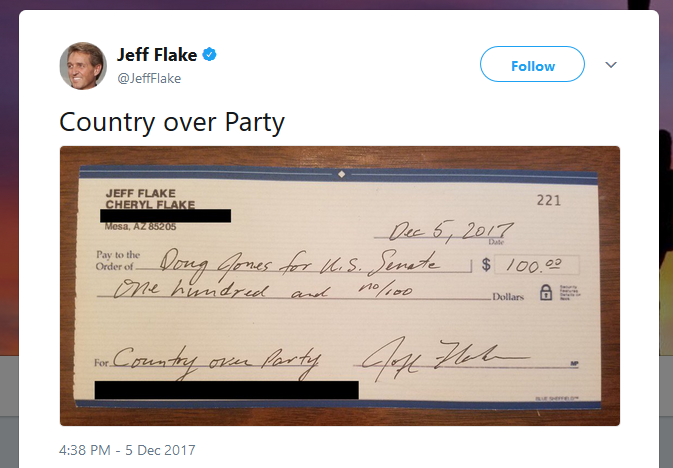Arizona Republican Senator Jeff Flake recently made a $100 contribution to Alabama’s Democratic candidate for U.S. Senate, Doug Jones. Along with the donation, Flake sent out this tweet:
Country over Party pic.twitter.com/JZMTaEYdxQ
— Jeff Flake (@JeffFlake) December 5, 2017
Why’d Flake do this? To make a political statement. From Flake’s perspective, the message is: I am willing to put aside partisan interests and support an alternative to Republican candidate Roy Moore, whom Flake has called on to drop out of the race amid multiple sexual assault allegations. As Flake put it in the memo line of the check, “Country over Party.”
Others saw a less idealistic message. Some thought Flake’s statement was meaningless because he also supported the GOP’s tax reform bill. Others thought Flake was peacocking – using his donation to the claim moral high ground and receive positive attention. Steve Bannon, a Moore supporter, thought the statement was weak virtue signaling because the donation was only $100 (the maximum Flake could have donated was $2,700). GOP senator Ben Sasse, a fellow critic of Moore, thought Flake’s statement with his donation was misguided because it showed implicit support for Doug Jones’ liberal positions on abortion.
But what no one thought, regardless of their political stripes – in support of Flake or against him – was that Flake had “bought” something from Doug Jones.
This was not transactional politics – Flake did not “buy” a Doug Jones vote on any one issue. He did not pay to influence Jones toward Flake’s way of thinking. He didn’t even give so that he could have access to Doug Jones at some future donor event or on Capitol Hill. Flake’s contribution was his speech, his form of advocacy, and his public disassociation from Roy Moore.
The vast majority of political donations are of this nature. They are contributions that are saying, “I want to be part of Team Hillary, so I donated to support her,” or “I believe in fighting global warming, so I’m giving to Bernie Sanders,” or “I support building the wall, so I gave to Trump!” For people who can’t publish their thoughts in newspapers and don’t have time to volunteer, political contributions are one of the easiest and clearest forms of expression.
To be sure, this is not the only motive for political donations, but it is the primary motivation of most contributors. When efforts are made to “get money out of politics,” we should all remember that those laws and rules will effectively limit this form of political expression.
Astute readers may also notice that Flake redacted his address on the picture of his donation check. Flake, presumably like many Americans, was willing to make his political statement, but not willing to do so if it invaded his privacy. He might have felt that his controversial statement could lead to harassment and threats to his family. But if Flake had given just $200 to Doug Jones, he wouldn’t have had this luxury. He would be legally required to report his address to make the donation, which would be published in a searchable government database of all political donations. Would Flake have used a political donation to express his opinion under those circumstances? I suspect probably not.
This kind of seemingly innocuous regulation intended to promote reasonable “good government” goals is exactly the kind that ends up restricting political expression when it takes the form of campaign contributions.














